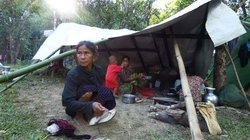 "We need access, predictable, sustained access, to reach the people in need," a UN official has said regarding those displaced by conflict in Myanmar's western state of Rakhine.
"We need access, predictable, sustained access, to reach the people in need," a UN official has said regarding those displaced by conflict in Myanmar's western state of Rakhine. RNA - At the end of her six-day visit to the country, UN Assistant Secretary-General for Humanitarian Affairs Ursula Mueller told Reuters late Tuesday that authorities had rejected her requests to meet the people displaced by fighting between the military and rebels that broke out late last year.
"If the assistance, including mobile clinics, cannot get to the people, they just don’t have the services and their needs are not being met and some people are dying."
Clashes between government troops and the Arakan Army (AA), a Buddhist rebel group calling for greater autonomy for Rakhine, have left about 33,000 people displaced.
Rakhine was the scene of an organized deadly crackdown on Muslims by the country’s military and Buddhist mobs. Thousands were killed and some 800,000 Rohingya Muslims fled to neighboring Bangladesh, where they currently live in camps in dire conditions.
Last year, a UN fact-finding mission said the campaign against the Rohingya was orchestrated with “genocidal intent,” and urged charging the army chief and five other generals with the “gravest crimes under international law.”
The mission on Tuesday called on all countries to cut financial and other ties with the country’s military in a bid to pressure the military and potentially reduce the violence against the Muslims.
Mueller met with top officials in the capital, Naypyitaw, including state counselor Aung San Suu Kyi, during her stay.
"I was pointing out the humanitarian needs that are existing that need to be urgently met," she said.
Mueller also visited camps outside the state's capital, Sittwe, where thousands of Rohingya Muslims have been confined to camps since a previous bout of violence swept Rakhine in 2012. They are denied full citizenship, free movement, access to decent healthcare and education.
Myanmar has reportedly been working with the UN on a strategy to close the camps, but it amounts to constructing new, more permanent homes in the same place rather than letting people return to areas from which they fled.
Mueller, who is also a deputy coordinator for emergency relief, said she had discussed the strategy with officials.
"It's not enough to erect buildings on the same site while the underlying causes are not addressed," she said.
"People have no freedom of movement. They are losing hope after seven years in this camp."
847/940